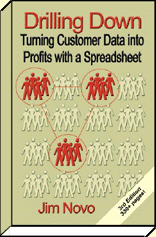Getting Up to Speed on
Database and Direct Marketing
I spoke recently at an industry
conference and had a chance to talk with lots of marketing people
about how things are going at their shop. The common thread in
many of these discussions? People were simply unprepared for the
onslaught of CRM, and lack the knowledge to really take advantage of
the functionality of this software.
CRM, as frequent readers of this site probably know, is largely
database marketing with a new name. I'm not trying to minimize
the importance of CRM and the technological advances that have been
made; what I am saying is most of the "marketing guts" in
CRM equate to classic database marketing.
An intimate understanding of database marketing is critical to
generating ROI using CRM. Period. So in an effort to help
people educate themselves on the concepts they need to understand and
practice, I offered the 5 following suggestions to attendees.
Perhaps you could make use of them as well.
1. Subscribe to these free offline publications, and
read every issue cover to cover, even if you don't think the article
is relevant. You must begin to think like a database marketer,
and there is a certain mindset you have to develop.
DM News
Online version of the direct marketing trade magazine.
The offline weekly is a must read for Data-Driven marketing types. Online article database
does not include all articles!
DIRECT Magazine
Direct marketing trade magazine, targeted at the hard core
data-driven marketer rather than beginners to the practice. Here again,
the Online article database does not include all articles in the magazine.
2. Learn the fundamentals of consumer behavior and / or
buyer behavior. Take a night course at a local college or audit
the class for a semester. This is critical, because you have to
begin to look at data from the behavioral perspective. The whole
key to database marketing is interpreting the reactions of customers
to marketing events. You have to be able to look at data and
say, "Ah, I know what these people are thinking!"
If
you can't find the time to do this, find out which textbooks are
currently used in MBA customer / buyer behavior courses and read
through them. This information will be a lot more useful to you
than a lot of the "soft shoe" books published by industry
pundits.
3. Hire staff from the catalog industry. The
people you want are the ones in "Circulation Planning" or a
similar discipline. Make sure they are actually in charge of
selecting lists and deciding who will receive a catalog or not.
Even better would be also having direct P & L responsibility for a
catalog, including control over merchandise selection and positioning
within the book.
If your company doesn't sell merchandise, I offer you the
same advice. What you are hiring here is a mindset, a
customer-focused ROI approach to the business process. Catalog
people already live and breathe this stuff. Obviously, they have
to have some idea of how to apply what they know to your business, but
at some level, data is data. If you have a customer database,
these people will know how to organize and use it. The magazines
above both list recruiters who specialize in database marketing
people.
4. Think like Charles Darwin. Survival of
the fittest is the whole idea behind database marketing - customers,
products, divisions, call centers, whatever. Every area of the
business has a fair shot to prove itself, to go into the ring and
fight for budget money. After the fair shot, resources are
allocated to the winners, which will grow into even bigger
winners. Losers are written off. Cut your losers sooner
and ride your winners longer. The challenge is constant
incremental business improvement by tracking everything and making
decisions based on the facts, which in database marketing, are most
always obvious. No need to play hunches after the results are
in.
5. Test everything like a maniac. You should
always have at least eight or ten tests running at the same time,
running underneath the "whatever is working now" marketing
that is powering your growth. Organize these tests in some kind
of sequence, so that the results of one test provide feedback for the
next. It's similar in concept to the way many legal systems
operate. Each new law is built upon the laws that came before
it, which in turn were built on the laws that came before them.
The goal of each test is not only to discover new ways to make money,
but also to provide input for the next series of tests. Start
with very broad, fundamental ideas as your base, and work towards
smaller segments and ideas. Don't get caught up in the CRM /
data mining trap of "overtargeting" - creating segments so
small they are meaningless to the big picture.
What you are trying to do is build an ever higher pyramid based on
the results of your testing. The peak of the pyramid is
every dollar spent generating maximum ROI and you will never get
there, but it sure is fun trying!
6. (Bonus) Read everything on this site. Look, I
don't have any vested interest in you reading the whole site; I don't
sell advertising and don't need the page views. The site was
designed to teach you how to get started with database marketing
concepts if you don't have any previous experience. The
site navigation at the top of every page is divided
into 4 sections: Marketing Approach is about orienting people
in the basics of how to use database marketing depending on their
marketing goals. Behavioral Analytics is about the theory and
techniques used in database marketing. Customer Models is
about simple models you can use right away to create High ROI Customer
Marketing Programs. Web Site is a collection of all the tools
one usually finds on a web site - FAQ, Search, etc.
So make use
of the site to "Do-It-Yourself" or contact me about scheduling
a Database Marketing / Analytics RoundTable.
And of course, it would be a good idea to get the Drilling
Down book, because it teaches you a very simple method for making
money with database marketing. Without having a Ph.D.
| 
![]()
